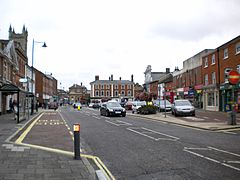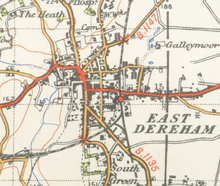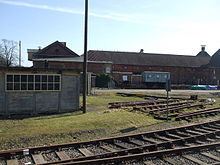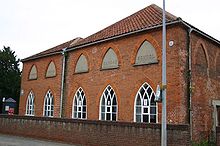- Dereham
-
Coordinates: 52°40′56″N 0°56′26″E / 52.682199°N 0.940445°E
Dereham
The market place on High Street
 Dereham shown within Norfolk
Dereham shown within NorfolkArea 21.51 km2 (8.31 sq mi) Population 15,659 (2001 census) - Density 728 /km2 (1,890 /sq mi) OS grid reference TF988132 District Breckland Shire county Norfolk Region East Country England Sovereign state United Kingdom Post town DEREHAM Postcode district NR19, NR20 Dialling code 01362 Police Norfolk Fire Norfolk Ambulance East of England EU Parliament East of England UK Parliament Mid Norfolk List of places: UK • England • Norfolk Dereham, also known as East Dereham, is a town and civil parish in the English county of Norfolk. It is situated on the A47 road, some 15 miles (25 km) west of the city of Norwich and 25 miles (40 km) east of King's Lynn. The civil parish has an area of 21.51 km2 (8.31 sq mi) and in the 2001 census had a population of 15,659 in 6,941 households. For the purposes of local government, Dereham falls within, and is the centre of administration for, the district of Breckland.[1]
Since 1983 Dereham has been twinned with the town of Rüthen in North Rhine-Westphalia, Germany. It is also twinned with Caudebec-lès-Elbeuf - France
Contents
History
Early history
It is believed that Dereham's name derives from a deer park that existed in the area, although it is known that the town pre-dates the Saxon era.[2] Saint Wihtburh, the youngest daughter of Anna, King of the East Angles, founded a monastery there in the seventh century after seeing a vision of the Virgin Mary; the monastery is mentioned by Bede, but little further is known of it.
Many of the town's ancient buildings were destroyed in the serious fires that took place in 1581 and 1659. Notable buildings that survived the fire include the Church of Saint Nicholas' and the nearby Bishop Bonner's cottage.
Railways
The railway arrived in Dereham when a single track line to Wymondham opened in 1847. In 1848 a second line, to King's Lynn was opened. In 1849 a line from Dereham to Fakenham was opened, this line being extended to the coastal town of Wells-On-Sea by 1857. In 1862 the town's railways became part of the Great Eastern Railway. The town had its own railway depot and a large complex of sidings, serving local industry. In 1882 the line between Dereham and Wymondham was doubled, to allow for the increasing levels of traffic.
In 1964 passenger services between Dereham and Wells were withdrawn, and the track between Fakenham and Wells was lifted soon after. In 1965 the line from Dereham to Wymondham was returned to single track, with a passing loop at Hardingham. The line to King's Lynn was closed in 1968, and the last passenger train on the Dereham to Wymondham line ran in 1969 although the railway remained open for freight until 1989.
Dereham labels itself "The Heart of Norfolk" due to its central location in the county, the Tesco car park being cited as the exact centre.[3] In the spring of 1978, the "Heart" was given the seven-mile £5m part-dual-carriageway A47 bypass. A section of this road, between Scarning and Wendling was built along the former railway line towards Swaffham and King's Lynn. This section of railway had been used as a location for the filming of Dad's Army, where Captain Mainwaring is left dangling from a railway bridge after a flight on a barrage balloon.
The railway between Dereham and Wymondham has been preserved, and is now operated as a tourist line by the Mid-Norfolk Railway Preservation Trust. This charitable company also owns the line north towards County School railway station and aims to eventually relay the line to Fakenham. The town should not be confused with the Norfolk village of West Dereham, which lies about 25 miles (40 km) away.
Saint Withburga
The town lies on the site of a monastery founded by Saint Withburga in the seventh century. A holy well at the western end of St Nicholas' Church supposedly began to flow when her body was stolen from the town by monks from Ely, who took the remains back to their town.
In the 18th century an attempt was made to turn Dereham into a new Buxton or Bath by building a bath house over Withburga's Well. It was described at the time as a hideous building of brick and plaster and was never popular. In 1880 the local vicar, Reverend Benjamin Armstrong obtained permission to pull the building down. The spring was then protected by iron railings, but fell out of use and became choked with weeds. Since 1950, however, it has been kept clear of weeds—although the railings still prevent access to the waters. Close examination of the Withburga story will cast doubt on Dereham being the location of the Saint's abode and resting place. The legend states that monks from Ely came 'up the river' at night and stole her body, taking it back to Ely to rest with her sisters, who were already considered saints. A look at a map will prove this to be an impossibility as there is no river connecting Ely with East Dereham, although it is possible to navigate a river from Ely to West Dereham. Until proved otherwise, Dereham continues to be considered the site of Withburga's home and violated grave.
Industry and employment
Dereham was the home to the "Jentique" furniture factory which made boxes for both instruments and bombs during the 2nd World War. The town was also the home to the Metamec clock factory. "Hobbies of Dereham" produced plans, kits and tools, including their famous treadle fretwork saws, for making wooden models and toys which were popular in the days before moulded plastic. At one point Hobbies owned 10 shops in prestige locations all over the UK. In the early 1960s the firm was taken over by Great Universal Stores, who sold the shops and closed the business. However, due to a shrewd management purchase of the "old traditional" parts of the firm, Hobbies rose again, limiting itself to a role as specialist model makers shop. After nearly 40 years of its new lease of life the firm closed in 2009. Cranes of Dereham and its successor the Fruehauf trailer company was a major employer in the town for many decades. Cranes built nearly all the giant trailers (100 tons plus) that carried equipment such as transformers at slow speeds across the UK, usually in the livery of Wynns or Pickfords. The launch of a new trailer was treated rather like that of a ship with lots of people coming out to see the leviathan move through the narrow streets of the town towards the A47. The town also had several large maltings. Almost all this large scale industry has drifted away since the 1980s.
Youth and community provision
Schools
Nursery and pre-school
- Toftwood Nursery Pre-School
- Scarning Pre-School
Infant and junior schools
- Scarning Primary school
- Grove House Nursery and Infant Community School
- Dereham CE VA Infant School and Nursery
- Dereham St. Nicholas Junior School
- King's Park Infant School
- Toftwood Infant School
Secondary schools
- Neatherd High School
- Northgate High School
Sixth form college
- Dereham Sixth Form College
Scouts
Dereham has two active Scout Groups, both of which are part of The Scout Association. 1st Dereham is notable as one of the earliest Groups set up in the world, having been formed in 1908. In the past there was also a 3rd Dereham Scout Group.
Air Training Corps
The town is the home of 1249 Squadron, Air Training Corps, who parade at the Cadet Centre on Norwich Road.
Army Cadet Force
The Army Cadets also parade at the Cadet Centre on Norwich Road.
Attractions
Notable buildings in the town include the pargetted Bishop Bonners Cottage, built in 1502, the Norman parish church, a windmill and a large mushroom-shaped water tower. The Gressenhall Museum of Rural Life is nearby. The town also hosts the headquarters of the Mid-Norfolk Railway, which runs trains over an 11.5-mile railway to Wymondham, as well as owning the line 6 miles north to North Elmham and County School Station.
Notable people
Famous people from the town include novelist Brian Aldiss, author George Borrow, footballer Harry Cripps, the antiquarian Sir John Fenn, Lady Ellenor Fenn, architect George Skipper, singer Beth Orton and scientist William Hyde Wollaston. William Cowper, poet, died in Dereham, and is buried in St Nicholas's Church, where there is a commemorative stained glass window. The Oldhall family held the manor in the fourteenth and fifteenth centuries: notable members of the family included Sir William Oldhall, Speaker of the House of Commons and his brother Edmund Oldhall, Bishop of Meath.
References
- ^ Office for National Statistics & Norfolk County Council (2001). Census population and household counts for unparished urban areas and all parishes. Retrieved December 2, 2005.
- ^ http://www.derehamtimes.co.uk/content/derehamtimes/content/Community/DerehamHistory.aspx Dereham Times, About Dereham
- ^ http://www.edp24.co.uk/Content/Postcard_From/dereham.asp Eastern Daily Press, Postcard from Dereham
External links
Destinations from Dereham 
Gressenhall Hoe, North Elmham Swanton Morley, Bawdeswell, Elsing, Lyng 
Scarning, Swaffham 
North Tuddenham, Mattishall, Norwich  Dereham
Dereham 

Shipdham, Watton Yaxham, Garvestone Boroughs or districts Major settlements - Acle
- Attleborough
- Aylsham
- Cromer
- Dereham
- Diss
- Downham Market
- Fakenham
- Gorleston-on-Sea
- Great Yarmouth
- Hingham
- Holt
- Hunstanton
- King's Lynn
- Loddon
- North Walsham
- Norwich
- Redenhall with Harleston
- Reepham
- Sheringham
- Stalham
- Swaffham
- Thetford
- Thorpe St Andrew
- Watton
- Wells-next-the-Sea
- Wymondham
See also: List of civil parishes in Norfolk
Topics Categories:- Breckland
- Market towns in Norfolk
- Towns in Norfolk
- Civil parishes in Norfolk
Wikimedia Foundation. 2010.






